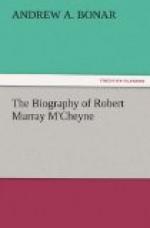Thus he spent the first years of his ministry in Dundee. The town began to feel that they had a peculiar man of God in the midst of them, for he lived as a true son of Levi. “My covenant was with him of life and peace, and I gave them to him for the fear wherewith he feared me, and was afraid before my name. The law of truth was in his mouth, and iniquity was not found on his lips; he walked with me in peace and equity; and did turn many away from iniquity.” Mal. 2:5, 6.
CHAPTER IV.
HIS MISSION TO PALESTINE AND THE JEWS.
“Here am I; send me”—Isaiah 6:8.
Though engaged night and day with his flock in St. Peter’s, Mr. M’Cheyne ever cherished a missionary spirit. “This place hardens me for a foreign land,” was his remark on one occasion. This spirit he sought to kindle yet more by reading missionary intelligence for his own use, and often to his people at his weekly prayer-meeting. The necessities both of his own parish, and of the world at large, lay heavy on his soul; and when an opportunity of evangelizing occurred, there was none in Scotland more ready to embrace it. He seemed one who stood with his loins girt: “Here am I; send me.”
Another motive to incessant activity, was the decided impression on his mind that his career would be short. From the very first days of his ministry he had a strong feeling of this nature; and his friends remember how his letters used to be sealed with this seal, “The night cometh” At a time when he was apparently in his usual health, we were talking together on the subject of the Pre-millennial Advent. We had begun to speak of the practical influence which the belief of that doctrine might have. At length he said, “That he saw no force in the arguments generally urged against it, though he had difficulties of his own in regard to it. And perhaps (he added) it is well for you, who enjoy constant health, to be so firmly persuaded that Christ is thus to come; but my sickly frame makes me feel every day that my time may be very short.”
He was therefore in some measure prepared, when, in the midst of his laborious duties, he was compelled to stand still and see what the Lord would do.
In the close of 1838, some symptoms appeared that alarmed his friends. His constitution, never robust, began to feel the effects of unremitting labor; for occasionally he would spend six hours in visiting, and then the same evening preach in some room to all the families whom he had that day visited. Very generally, too, on Sabbath, after preaching twice to his own flock, he was engaged in ministering somewhere else in the evening. But now, after any great exertion, he was attacked by violent palpitation of heart. It soon increased, affecting him in his hours of study; and at last it became almost constant. Upon this, his medical advisers insisted on a total cessation of his public work; for though as yet there was no organic change on his lungs, there was every reason to apprehend that that might be the result. Accordingly, with deep regret, he left Dundee to seek rest and change of occupation, hoping it would be only for a week or two.




